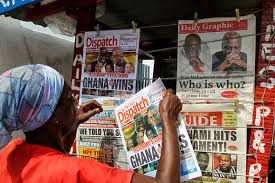The drop in Ghana’s crude oil production and the decrease of 6.78% in 2023, contributing to an average annual decline of 9.2% over the past four years is one of the leading stories in the Ghanaian press on Wednesday.
The Graphic reports that Ghana’s crude oil production saw a decrease of 6.78% in 2023, contributing to an average annual decline of 9.2% over the past four years, according to the Public Interest Accountability Committee’s (PIAC) 2023 Annual Report on the Management and Use of Petroleum Revenue.
The report revealed that Ghana produced 48,247,036.61 barrels of oil in 2023, down from 51,756,481 barrels in 2022. This decline continues a trend from the peak production year of 2019, when 71,439,585 barrels were produced.
Production fell to 66,926,806 barrels in 2020 (a 6.32% decline), 55,050,391 barrels in 2021 (a 17.75% decline), 51,756,481 barrels in 2022 (a 5.98% decline), and 48,247,036.61 barrels in 2023 (a 6.78% decline).
“The 2023 production figure represents the fourth consecutive year of reduction in annual production volumes since 2010,” the report noted.
Ghana’s crude oil is produced from three fields: Jubilee, TEN, and Sankofa Gye-Nyame (SGN). The Jubilee Field began production in December 2010, followed by TEN in August 2016 and SGN in May 2017.
In 2023, the Jubilee field accounted for 63% of the total crude oil production with 30,444,217 barrels, while the SGN field produced 11,086,541.61 barrels (23%) and the TEN field produced 6,716,278 barrels (14%).
Emerita Professor Ardayfio-Schandorf, Chairperson of PIAC, attributed the production decline to a lack of investment in discovering new fields and the natural ageing of existing fields, leading to reduced output.
The newspaper says that the Bank of Ghana is committed to pursuing sound monetary policies aimed at achieving a stable level of inflation in line with its medium-term target, Director of Communications, Bernard Otabil has said.
He said bringing inflation down to the target level was a precondition to achieving sustainable economic growth and over the long term, ensuring economic prosperity in the country.
Mr Otabil said a stable and lower inflation would also help promote exchange rate stability under a floating currency regime.
Speaking to the media to respond to comments that the Monetary Policy Committee (MPC) was deliberately keeping the policy rate high for the cental bank to make more profits, he said anyone who makes such claims does not understand central banking fully because high interest rate was rather inimical to the operations of central banks.
He said high interest rates rather increases the cost of the BoG’s open market operations and leads to large losses.
“But that’s the price central banks pay to achieve stable prices, Central banks are not commercial banks and do not seek profits, nor do they face the same financial constraints as private institutions.
“Central banks by nature of their work are supposed to provide a public good and that public good is low and stable inflation which comes at a cost,” he said.
The Director of Communications also added that central banks could make losses, get into negative accounting equity and still function effectively, stating that “a loss does not imply loss of policy effectiveness.”
The Ghanaian Times reports that the European Union (EU) has committed EUR 33.5 million towards the expansion and reinforcing of Technical and Vocational Education Training (TVET), in Ghana.
The initiative, which is under the EU-Ghana Pact for Skills programme, seeks to improve education and job creation in Ghana.
The EU Ambassador to Ghana, Irchad Razaaly, who announced this at the ‘Study in Europe’ networking event in Accra, on Monday, which formed part of activities to mark the EU Day celebration, said: “we want to be a partner for the future of Ghana. Strengthening education and job creation is the best way to realise this ambition”.
He said the programme would empower Ghana’s workforce through enhanced skills development and employment opportunities.
Mr Razaaly said the EU remained dedicated to the Erasmus+ programme aimed at supporting education, training, youth and sport in Europe.
He indicated that Erasmus+ was a central pillar of the EU’s support for education, offering Ghanaian youth a unique opportunity to gain top-level academic experience.
“Beyond schooling, Erasmus allows for cultural exchange between Europe and students from around the world,” The EU Ambassador said.
“Each year, approximately 1000 students fly over to the best universities in Europe with the help of scholarships offered by the EU and its member states. In addition, European Universities provide many scholarships through bilateral agreements with Ghanaian Universities,” he added.
The newspaper says that the Electoral Commission (EC) says it has no intention of extending the deadline for the ongoing voters registration exercise since the pressure at centres has reduced.
It has, therefore, encouraged eligible voters who have not yet registered to do so before the 21 days for the exercise elapsed.
“Eligible voters should not wait till the last day of the registration exercise to do so,” the Deputy EC chairman in charge of operations, Samuel Tettey, said at a press conference in Accra yesterday.
Responding to a question relaying calls for extension by some politicians, he said the initial queues had watered down significantly and the commission is currently not recording high numbers witnessed in the first week except in a few places.
“We do not think at this time it is feasible for someone to call for exten¬sion of the exercise,” he said.
Giving updates on the registration so far, Mr Tettey said in the first 13 days of the exercise (as of Sunday), 532, 025 eligible voters had been captured out of the 623,000 projected by the commission.
Males are 246,455, representing 47.21 per cent, and females, 275,570, representing 52.79 per cent, and first time voters, those between the ages of 18 and 21, are 446,416, representing 85.52 per cent of the total number of registered voters.
Persons with Disabilities are 813, representing 0.16 per cent of the total registered voters.
GIK/APA
Ghana: Press zooms in on drop in Ghana’s crude oil production, others


